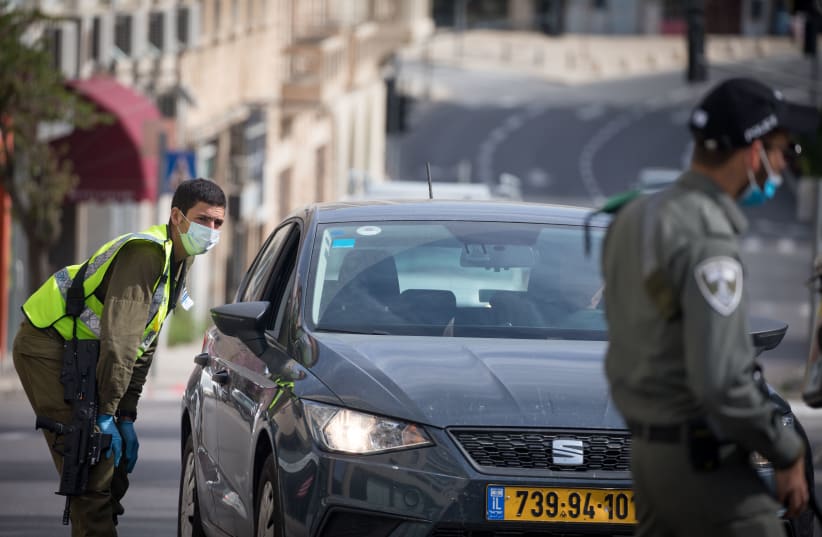Police officers received a message encouraging them to "enforce [the law] mercilessly and identify the coronavirus outlaws," Army Radio police affairs correspondent Hadas Shtaif revealed on Twitter.
"A message sent out to police officers," Shtaif wrote on Twitter. "Pressure to the point of threats to hand out mask fines. A source from the Public Security Ministry says it is the result [Public Security] Minister Amir Ohana's pressure on the commissioners," she added.
"Whoever came to work at the [coronavirus] directorate and thinks he is on vacation is wrong," the screenshot message read. "Enforcement must be done mercilessly and the coronavirus outlaws should be identified."
הודעה שנשלחה לשוטרים. לחץ עד איום לתת דוחות על מסכות. גורם מהמשרד לבטפ אומר, זה תוצאה מהלחץ שמפעיל השר אמיר אוחנה על הפיקוד. ..קאפיש? pic.twitter.com/f2AJc9DERM
— hadas shtaif. הדס (@hadasshtaif) July 9, 2020
It "simply cannot be that there are officers from other units who find [people not wearing masks] and there are officers among us who cannot find anything," the message continued.
"The deal is clear," it said. "Whoever returns with no enforcement will go back to working in Traffic Police with a stain in his personal file and a hearing for failing a department task, and it is not a nice place to be for anyone."
In communications obtained by The Jerusalem Post's sister publication, Maariv, an officer said "it is amazing. Do not worry, it does not mean it is you. It is the pressure on the officer in the field, from his superiors. There is no surprise that some slide into violent enforcement."
Israel Police Spokesperson's Unit responded to the Maariv report, saying "most encounters of civilians concerning not wearing face masks end with no fines but rather with a warning and an explanation, as long as the civilian is cooperating."
They added that in some cases, "officers encounter citizens who grossly disregard the law, resist enforcement or try to sabotage it. It needs to be reiterated that refraining from enforcing any [law] will never be effective in prevention, will not lead to civil discipline and will not be able to stop the contagion."
Israel Police's broad enforcement of the emergency regulations came under heavy criticism over the last several weeks amid growing claims of police brutality.
On Monday, Public Security Minister Amir Ohana requested Attorney-General Avichai Mandelblit allow the release of body cam footage from the alleged cases of violence without the materials being considered a disruption of the ongoing investigations of the cases, N12 reported.
Ohana's request came following a video of a violent arrest of a 24-year-old in Holon, south of Tel Aviv, over the weekend. The video shows the man being approached by two uniformed officers for not wearing a mask. The man was tased and beaten by the officers while on the ground, requiring medical care following his arrest.
On Tuesday, N12 police affairs correspondent Moshe Nussbaum said he was told by police that law enforcement turn off their body cams when approaching or arresting minors, in response to a request of footage from the alleged detainment of a 13-year-old girl in Jerusalem.
13-year-old Bessy Getter was wearing a face mask while pushing a stroller down the street, taking it "off for a few minutes because she was drinking a slushie," the girl's father told N12. The girl herself told the media outlet she was told by police she would be taken to the station in response to her pleading she was wearing the mask.
Last Wednesday, video of the arrest of an autistic teenager caused outrage on social media. Shot in the southern city of Dimona, the video showed the special-needs 17-year-old being violently subdued by law enforcement.
"The kid is broken. It is disgraceful," the boy's father told N12. "They broke two of his teeth, they broke his face, he is completely covered in blood," he added. "If police behave in such a way, they are a gang" rather than law enforcement.
"What is the problem with giving him a NIS 500 ($145.5) fine? Why would you beat him? They say he refused to identify, but the police officer is a neighbor who lives nearby," he continued.
"The kid is in special education and has special needs and slow development. He did not even know what they want from him and why they are beating him," he said. "It is disturbing and horrible."
Also last Wednesday, the Knesset rejected a motion by MK Tamar Zandberg (Meretz) to inquire recent cases of alleged police brutality against citizens.
The motion was submitted by Zandberg following the controversial arrest of retired IAF officer Brig.-Gen. Amir Haskel at a protest outside Prime Minister Benjamin Netanyahu's residency in Jerusalem.
The motion was to be voted upon on the one-year anniversary Ethiopian-Israeli Solomon Tekah's killing by police and the death of special-needs Palestinian Iyad al-Hallak a month prior.
Hallak, a 32-year-old special-needs student from east Jerusalem, was shot by Border Police in the Old City on his way to Jerusalem's Elwyn school for children and adults with disabilities.
Police issued a statement after the shooting, saying officers noticed a "suspicious object" in his hands. According to N12, Hallak fled from the officers to a nearby garbage room. Hallak was shot seven to eight times, with the coroner's report saying two of the bullets hit him, according to Walla.
His mother, Rana al-Halak, accused police of burying the recording of the shooting mid June, according to Ynet.
